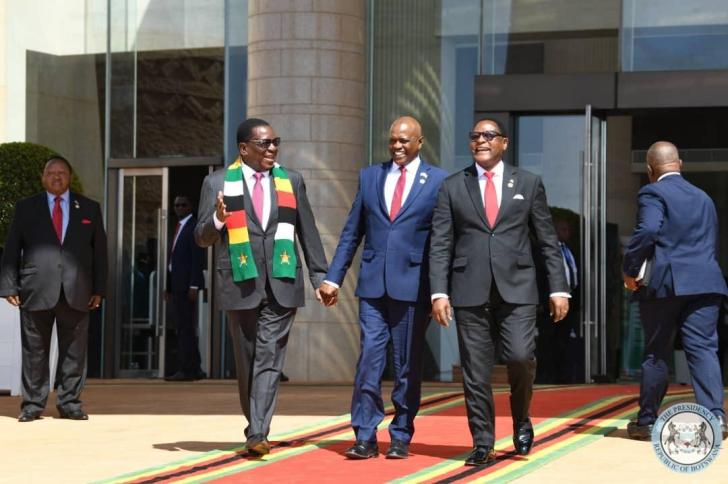News / National
Mnangagwa's farm blows away Masisi
19 Aug 2024 at 06:06hrs |
0 Views

Botswana President Mokgweetsi Masisi was deeply impressed by President Mnangagwa's Precabe Farm, located near Kwekwe, Zimbabwe, describing it as the "Garden of Eden" due to its lush green fields of wheat and barley. The farm, equipped with advanced irrigation systems, has become a model of agricultural excellence and sustainability in Africa, drawing admiration from leaders across the continent.
Precabe Farm's impressive agricultural yields and innovative farming techniques have set a benchmark for farmers and policymakers throughout Africa. President Mnangagwa's leadership in developing the farm underscores his commitment to ensuring food security in Zimbabwe and beyond, making the farm a symbol of his vision for a self-sustaining future.
President Mnangagwa took to social media to express his pride in hosting President Masisi at the farm, particularly after the successful conclusion of the 44th SADC Summit in Harare. The visit provided an opportunity to showcase the progress Zimbabwe is making in agricultural development, reinforcing the strong ties between the two leaders.
President Masisi was overwhelmed by the scale and success of the farming operations at Precabe. He expressed his astonishment at the farm's productivity, stating that seeing it in person exceeded anything he had heard or read about. His admiration highlights the farm's role as a beacon of agricultural success in the region.
During his visit, President Masisi likened standing in the fields of Precabe Farm to being in the "Garden of Eden," emphasizing the farm's significance not just for Zimbabwe, but for Africa as a whole. This visit followed the 44th SADC Summit, where President Mnangagwa assumed the Chairmanship of the regional bloc, further solidifying Zimbabwe's leadership role in the region.
The close bond between Presidents Mnangagwa and Masisi was evident during the visit. The two leaders, who often exchange ideas, continue to surprise and inspire each other with their respective accomplishments. President Masisi humorously noted that he now faces the challenge of finding a way to match the surprise of Precabe Farm when President Mnangagwa visits Botswana.
Despite the challenges posed by the El Niño-induced drought, Zimbabwe's winter wheat crop has been a critical success, providing much-needed food security. President Mnangagwa informed President Masisi that the country's granaries are overflowing, a testament to the farm's productivity and the broader success of Zimbabwe's agricultural policies.
President Masisi praised President Mnangagwa for his ability to not only feed Zimbabweans but also to contribute to Africa's food security. He expressed his awe at President Mnangagwa's achievements, highlighting that his leadership in agriculture is a model for other African nations to follow.
The success of Zimbabwe's Land Reform Programme, which has been controversial in the West, was also underscored during the visit. The programme has produced a new generation of farmers whose output surpasses that of the former white farmers, demonstrating the potential for increased agricultural productivity across the region.
SADC Executive Secretary Elias Magosi, who also toured Precabe Farm, emphasized the importance of other member states replicating Zimbabwe's agricultural success. He encouraged countries with similar climates, such as South Africa, Zambia, and Mozambique, to learn from Zimbabwe's example, particularly in areas like irrigation and ecosystem management, to enhance food security across the continent.
Precabe Farm's impressive agricultural yields and innovative farming techniques have set a benchmark for farmers and policymakers throughout Africa. President Mnangagwa's leadership in developing the farm underscores his commitment to ensuring food security in Zimbabwe and beyond, making the farm a symbol of his vision for a self-sustaining future.
President Mnangagwa took to social media to express his pride in hosting President Masisi at the farm, particularly after the successful conclusion of the 44th SADC Summit in Harare. The visit provided an opportunity to showcase the progress Zimbabwe is making in agricultural development, reinforcing the strong ties between the two leaders.
President Masisi was overwhelmed by the scale and success of the farming operations at Precabe. He expressed his astonishment at the farm's productivity, stating that seeing it in person exceeded anything he had heard or read about. His admiration highlights the farm's role as a beacon of agricultural success in the region.
During his visit, President Masisi likened standing in the fields of Precabe Farm to being in the "Garden of Eden," emphasizing the farm's significance not just for Zimbabwe, but for Africa as a whole. This visit followed the 44th SADC Summit, where President Mnangagwa assumed the Chairmanship of the regional bloc, further solidifying Zimbabwe's leadership role in the region.
Despite the challenges posed by the El Niño-induced drought, Zimbabwe's winter wheat crop has been a critical success, providing much-needed food security. President Mnangagwa informed President Masisi that the country's granaries are overflowing, a testament to the farm's productivity and the broader success of Zimbabwe's agricultural policies.
President Masisi praised President Mnangagwa for his ability to not only feed Zimbabweans but also to contribute to Africa's food security. He expressed his awe at President Mnangagwa's achievements, highlighting that his leadership in agriculture is a model for other African nations to follow.
The success of Zimbabwe's Land Reform Programme, which has been controversial in the West, was also underscored during the visit. The programme has produced a new generation of farmers whose output surpasses that of the former white farmers, demonstrating the potential for increased agricultural productivity across the region.
SADC Executive Secretary Elias Magosi, who also toured Precabe Farm, emphasized the importance of other member states replicating Zimbabwe's agricultural success. He encouraged countries with similar climates, such as South Africa, Zambia, and Mozambique, to learn from Zimbabwe's example, particularly in areas like irrigation and ecosystem management, to enhance food security across the continent.
Source - The Herald
Join the discussion
Loading comments…


























